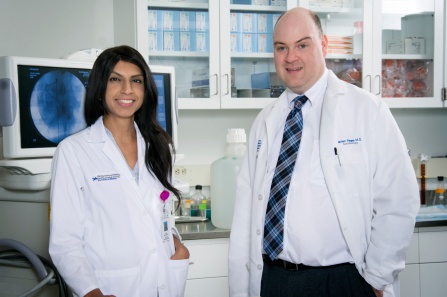Residents

“My goal is to make each internal medicine resident’s cardiology training an enriching and rewarding experience,” says Brian Page, left, with cariovascular fellow Asma Mursleen.
Cardiovascular medicine is a core component of internal medicine training, so we invest fully in your education, providing you with the clinical skill set you need for practice or to take your training to the next stage.
Residency Rotation
Our four-week cardiology rotation introduces you to the care of cardiology patients with varying degrees of clinical acuity. Our subspecialty-trained faculty will guide you through your training, enhancing your skills in diagnosing, evaluating and managing cardiac diseases.
Cardiac Critical Care/Cardiology Service
Location: Buffalo General Medical Center
In this rotation, you will gain experience managing a broad range of cardiac diseases under the supervision of a cardiology attending. To supplement your hands-on clinical experience, you may spend variable amounts of time on electrocardiogram (ECG) interpretation, echocardiography interpretation with emphasis on basic cardiac anatomy, physiology and pathophysiological correlation. Cardiology faculty will supervise your care of patients with primary cardiac problems, including STEMI, NSTEMI, heart failure and CAD. You will work with some patients in the Coronary Care Unit and others on a step-down unit.
Residency Elective
Deepen your understanding of primary cardiac conditions with a two- or four-week elective that gives you additional clinical experience in coronary care and step-down units.
Cardiology
Location: Buffalo General Medical Center and Buffalo VA Medical Center
You will provide consultative services at Buffalo General Medical Center or the Buffalo VA Medical Center. You will work with a cardiology fellow to initially evaluate patients with a variety of cardiovascular disorders, including acute and chronic manifestations of coronary artery disease, myocardial infarction, congestive heart failure, arrhythmias, valvular disorders and pericardial diseases. You will also participate in the workup of patients with chest pain and syncope. Your responsibilities will include:
- assessing preoperative cardiac risk in patients undergoing non-cardiac surgery
- managing cardiac issues in medical, surgical and neurologic patients
- evaluation observation unit patients, including following up on abnormal cardiac testing
Research Opportunities
Whether you’re interested in basic research, bench-to-bedside investigations or clinical studies, you’ll have the opportunity to work alongside established physician-scientists in our division.
You may use elective time to collaborate with us as we seek to better understand, treat and prevent cardiovascular disease.
We ask that you commit at least three months to a project in our division.
Upcoming Events
No events scheduled.
